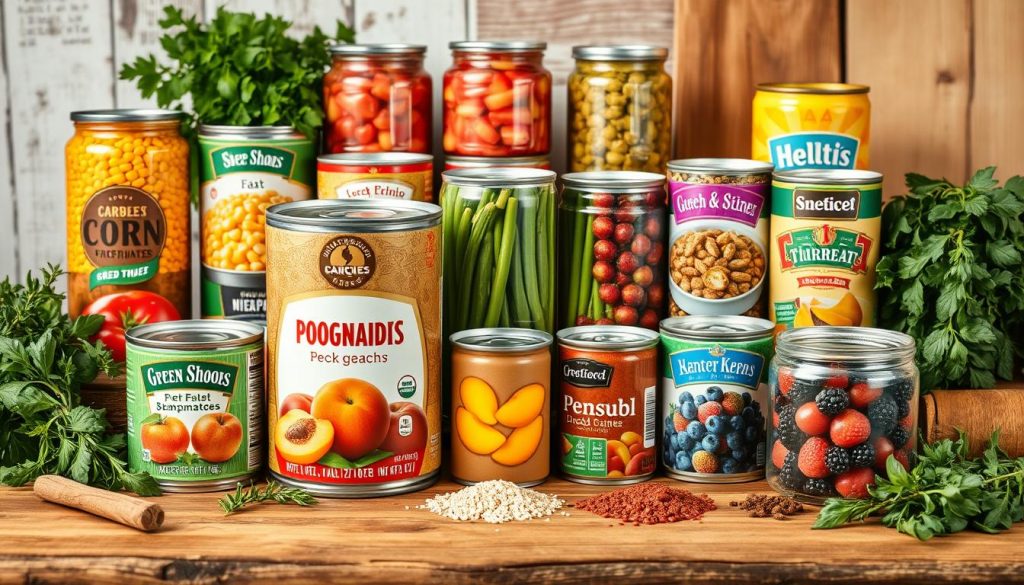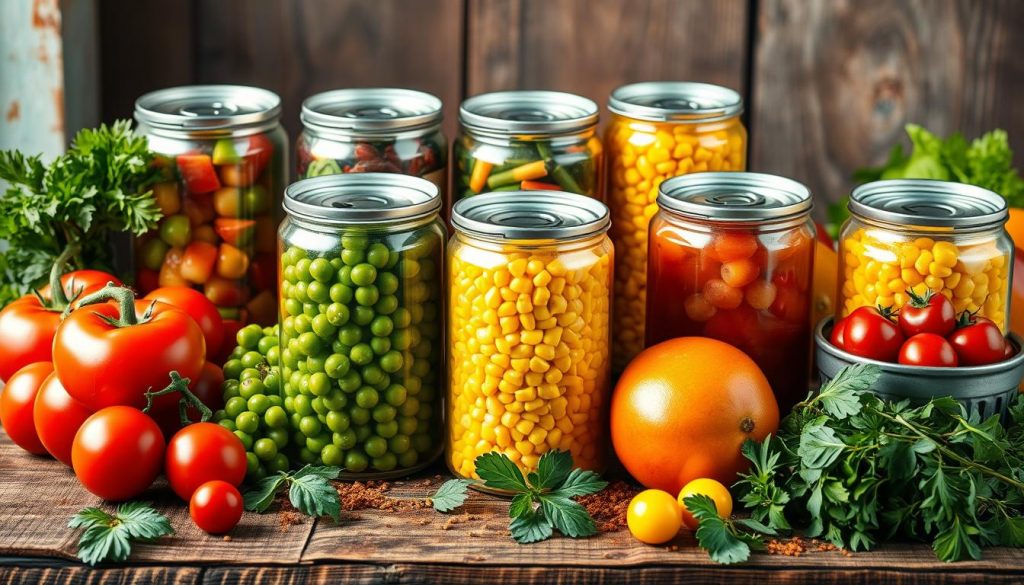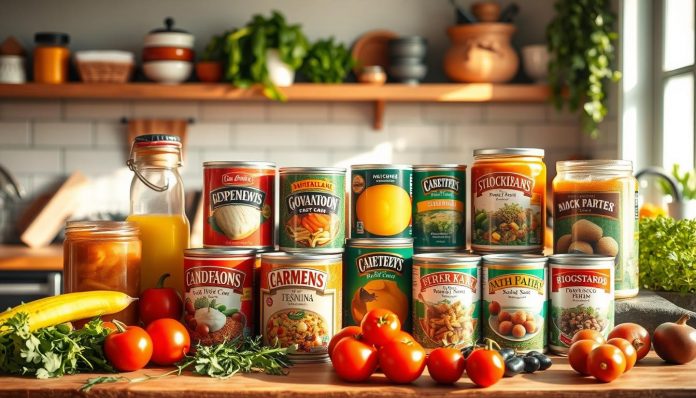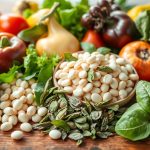When planning meals, you might not think of canned foods first. But they are a healthy and easy choice. They offer a variety of fruits, vegetables, and lean proteins. For instance, canned salmon is full of omega-3s, which are good for your heart.
Recipes that use canned foods are quick, taking about 20 minutes to make. This makes them perfect for busy days.
Canned vegetables and fruits are also great. They’re easy to use and packed with nutrients. Adding them to your meals can make them healthier and tastier. They’re ideal for those who want quick, easy meals or want to mix up their diet.
Table of Contents
Key Takeaways
- Canned foods can be a healthy and convenient option for meal planning
- Canned salmon is a source of omega-3 fatty acids, contributing to heart health
- Recipes utilizing canned foods emphasize time-saving benefits, with preparation times of approximately 20 minutes
- Canned vegetables and canned fruits offer a range of benefits, from convenience to nutritional value
- Incorporating canned foods into your meal planning can help you create healthy and delicious meals that cater to your dietary preferences
- Canned foods are a great way to add more variety to your meals and can be used in a range of dishes, from salads to soups
- Meal-prepping with canned foods can facilitate a 40% reduction in weekly cooking time for individuals or families
What Are Canned Foods?
Canned foods are a great choice for meal planning. They include canned meat, canned soup, and canned beans. These foods are heated to kill bacteria and then sealed in airtight containers.
This method makes them last long. It’s perfect for emergency food or for those who like non-perishable items. The USDA says canned foods are as nutritious as fresh ones, sometimes even more so.
The Process of Canning
Canning involves several steps. First, the food is cleaned and prepared. Then, it’s filled into cans and heated to kill bacteria. This creates a vacuum seal to keep out new contaminants.
Types of Canned Foods
Many types of canned foods exist, like fruits, vegetables, meats, and soups. You can find canned tuna, canned corn, and canned black beans. There’s also a wide range of canned soup, from tomato soup to creamy broth.
Nutritional Value
Canned foods are nutritious, packed with vitamins and minerals. Canned beans offer protein and fiber, while canned tomatoes are rich in vitamin C and lycopene. Adding canned foods to your diet can make meals more varied and nutritious.
Benefits of Canned Foods
Canned foods are great for your pantry. They last a long time, so you can keep them for months without needing the fridge. This makes them perfect for emergency food or places where fresh food is hard to get. Plus, they’re often cheaper than fresh foods.
Canned fish is a cheap and healthy protein source for many recipes.
Canned foods are easy to store and prepare. They’re perfect for busy lives. They also help reduce food waste and keep your pantry items fresh longer. Foods like canned fish and beans are full of protein and fiber, making them healthy for your meals.
Canned foods are versatile for making many meals and recipes. They’re great for salads, sandwiches, and more. Their long shelf life and affordability make them a smart choice for meal planning. They save you time and money.
Convenience and Accessibility
Canned foods are easy for meal planning because they last months without refrigeration. They’re ideal for emergencies or places with limited fresh food access. They’re also quick to prepare, perfect for busy lives.
Long Shelf Life
Canned foods last a long time, reducing food waste and keeping your pantry items fresh. This makes them a smart choice for meal planning, saving you time and money.
Cost-Effective Options
Canned foods are affordable, with many costing less than fresh options. For example, canned tuna is a cheap, healthy protein for many recipes. Canned beans and convenience foods add protein and fiber to your diet, making them a nutritious and budget-friendly choice.
Canned Foods vs. Fresh Foods
Choosing between canned and fresh foods might seem like a no-brainer. But, canned foods can be as nutritious as fresh ones. For example, canned tomatoes are packed with lycopene, an antioxidant that’s good for your health.
Canned foods, like canned vegetables and canned fruits, are easy to use and won’t break the bank. They’re often as nutritious as their fresh counterparts. Some even have more nutrients.
- Nutritional value: Canned foods can be just as nutritious as fresh foods, with some canned products having higher levels of certain nutrients.
- Flavor and texture: Fresh foods often have a more vibrant flavor and texture than canned foods, but canned fruits and canned vegetables can also be tasty and healthy.
In conclusion, canned foods are a smart choice for a healthy diet. They’re convenient, affordable, and full of nutrients. So, canned tomatoes, canned vegetables, and canned fruits are excellent for getting the nutrients you need.
How to Choose Quality Canned Foods
When picking canned foods, always read the labels. Look for products with less sodium and sugar. For example, you can make a tasty black bean soup with canned beans and veggies. Choose canned soup that’s made with real ingredients and no artificial stuff.
It’s also important to think about what you’re eating. Some canned meat can have too much sodium or nitrates. Pick “low-sodium” or “nitrate-free” options. Or, go for canned beans or canned soup for a healthier choice.
Reading Labels
- Check the ingredient list for added sugars and sodium
- Opt for products that are labeled as “low-sodium” or “nitrate-free”
- Choose products that are made with wholesome ingredients
Important Ingredients to Avoid
Being smart about canned food ingredients helps you make better choices. Whether it’s canned beans, canned soup, or canned meat, always check the labels. Pick items that are good for you and made with real ingredients.
| Canned Food | Healthy Option |
|---|---|
| Canned Beans | Low-sodium black beans |
| Canned Soup | Vegetable soup with no added preservatives |
| Canned Meat | Nitrate-free tuna |
Storing Canned Foods Properly
To keep canned foods safe and good, you need to store them right. Keep them in a cool, dry spot, away from sunlight and moisture. This is key for foods like canned fish, which can last up to 5 years if stored well.
Think about temperature, humidity, and light when storing these foods. The best spot is a room with a steady temperature between 50°F and 70°F. High heat can make bacteria grow, causing spoilage.
Ideal Storage Conditions
Here are some tips for storing canned foods:
- Avoid storing canned foods near heating vents or radiators
- Keep canned foods away from direct sunlight, which can cause temperatures to fluctuate
- Store canned foods in a dry place, away from moisture and humidity
Shelf Life Considerations
Remember, canned foods can last for years. But always check for spoilage before eating. Look for dents, rust, or swelling, which mean the can is bad.
By following these tips, your canned foods will stay safe and good for a long time. Whether it’s canned fish, convenience foods, or other shelf-stable items, proper storage is key.
| Type of Canned Food | Shelf Life | Storage Conditions |
|---|---|---|
| Canned Fish | Up to 5 years | Cool, dry place |
| Convenience Foods | Up to 10 years | Away from direct sunlight and moisture |
| Shelf-Stable Foods | Up to 20 years | Consistent temperature between 50°F and 70°F |
Popular Canned Food Options
Canned foods offer a wide variety of choices. Canned veggies like corn, peas, and carrots are perfect for soups, stews, and salads. Canned fruits, including pineapple, peaches, and mandarin oranges, are great for desserts, smoothies, or as yogurt or oatmeal toppings.
Canned meats, like tuna, chicken, and beef, are versatile. They can be used in salads, sandwiches, pasta sauces, and stir-fries. Some favorite canned foods include:
- Canned black beans, which are great in vegetarian chili or on tacos
- Canned diced tomatoes, perfect for soups, stews, or homemade pasta sauce
- Canned corn, ideal for salads, soups, or as a side dish
These canned foods help make delicious and healthy meals. Adding canned veggies, fruits, and meats to your diet brings flavor, texture, and nutrition to your meals.

Canned foods are perfect for quick meals or to add variety to your diet. With many types available, you’re bound to find something you like.
| Canned Food Option | Usage Ideas |
|---|---|
| Canned Vegetables | Soups, stews, salads, side dishes |
| Canned Fruits | Desserts, smoothies, yogurt toppings, oatmeal |
| Canned Meat | Salads, sandwiches, pasta sauces, stir-fries |
Creative Ways to Use Canned Foods
Canned foods open up a world of possibilities in cooking. You can whip up a tasty chili with canned beans or add canned soup to a casserole for extra taste. Canned fish is perfect for a quick salad or sandwich filling.
Getting creative with canned foods can elevate your favorite dishes. Try using canned beans for a healthy dip or canned soup to make pasta creamier. Canned fish is great for a simple stir-fry.
Here are some more ideas for using canned foods:
- Use canned beans to make a hearty and healthy stew
- Add canned soup to a soup or stew for extra flavor
- Use canned fish to make a delicious and easy-to-prepare salad or sandwich filling
By being creative with canned foods, you can create many tasty and healthy meals. Next time you’re at the store, grab some canned beans, canned soup, and canned fish. Then, get ready to cook up a storm!
Canned Foods in a Balanced Diet
Incorporating shelf-stable foods into your meal planning can add variety and nutrition. Canned fruits and vegetables are convenient and affordable. They provide essential vitamins and minerals, helping you maintain a healthy diet.
Canned foods are great for meal planning because they last long. For instance, canned black beans are perfect for vegetarian chili, adding protein. Canned fruits like peaches and pears can sweeten oatmeal or yogurt. These foods make healthy meals easy to prepare and enjoy anytime.
Role in Meal Planning
Adding canned foods to your meal planning is simple and convenient. They can be used in many dishes, from soups to salads. For example, canned tomatoes make a tasty pasta sauce, and corn adds flavor to salads. Canned foods can make your diet more varied and nutritious without costing much.

Portion Control
When using canned foods, remember to control your portions. They can be high in sodium and sugars. Choose low-sodium options and be mindful of your sizes to enjoy their benefits while keeping your diet balanced. Use canned beans and vegetables for a filling salad or add canned fruits to sweeten your oatmeal or yogurt.
Sustainability of Canned Foods
Thinking about the environment and your food choices? Canned foods might surprise you. They can help cut down on waste and last a long time. For instance, canned tomatoes are great for many recipes and are full of good stuff like lycopene.
Experts say canned foods are good for the planet. They help reduce plastic waste and are better than single-use plastic bottles. Plus, aluminum cans are good for the environment after just two uses.
Here are some benefits of canned foods:
- Less food waste
- Long shelf life
- Cost-effective
Every choice we make matters for the planet. Adding canned veggies, fruits, and meats to your meals can help. Ina Garten suggests planning your meals to avoid waste.
By choosing wisely, we can help our food system be more sustainable. Next time you shop, pick canned foods to help the environment.
| Food Type | Shelf Life | Environmental Impact |
|---|---|---|
| Canned Vegetables | 5-10 years | Low waste, reusable cans |
| Canned Fruits | 5-10 years | Low waste, reusable cans |
| Canned Meat | 5-10 years | Low waste, reusable cans |
Common Myths About Canned Foods
Many people think canned foods are less healthy than fresh ones. But, this isn’t always true. For example, canned beans are as nutritious as fresh beans. They’re also cheaper and last longer.
Some folks worry that canned foods aren’t safe. They think the canning process might be risky. But, canned soup and canned fish are safe if stored and handled right. They’re also great for quick, healthy meals.
Canned foods have many benefits. They last a long time, are easy to prepare, and are affordable. Canned beans are perfect for soups and salads, adding protein and fiber. Canned soup is quick for meals, and canned fish is a good source of omega-3s.
Knowing the truth about canned foods can make them a great part of your diet. They offer convenience and nutrition. So, consider canned beans, canned soup, and canned fish for your meals.
Conclusion: Embrace Canned Foods
Canned foods are versatile, nutritious, and easy to use in meals. They include vegetables, fruits, and proteins. Adding them to your diet saves time, cuts down on waste, and boosts nutrition.
Try new canned foods and add them to your meals. They’re great for quick dinners or healthy snacks. Canned foods make your meals balanced and satisfying. They open up a world of tasty possibilities.
FAQ
What are canned foods and how are they made?
What are the benefits of canned foods?
How do canned foods compare to fresh foods in terms of nutrition?
How can I store canned foods properly?
How can I incorporate canned foods into a healthy, balanced diet?
Are there any myths or misconceptions about canned foods?
Source Links
- 20 Low-Calorie Lunches for the Mediterranean Diet – https://www.eatingwell.com/mediterranean-diet-low-calorie-lunch-recipes-8772055
- 20 Low-Calorie Lunches for the Mediterranean Diet – https://www.yahoo.com/lifestyle/20-low-calorie-lunches-mediterranean-210000798.html
- Here’s How People Opened Canned Food Before The Can Opener Arrived – Chowhound – https://www.chowhound.com/1752470/hammer-chisel-canned-food/
- Homeowner shares tips for what to do with canned food past ‘best by’ date: ‘Not expiration date’ – https://www.thecooldown.com/green-home/canned-food-expiration-date-preppers-advice/
- Is Canned Clam Chowder Pre-Cooked? – Tasting Table – https://www.tastingtable.com/1752923/canned-clam-chowder-precooked/
- Don’t sleep on Seoul Cup-Bap in the River Market – Arkansas Times – https://arktimes.com/eat-arkansas/2025/01/09/dont-sleep-on-seoul-cup-bap-in-the-river-market
- Brent Berry Food Drive helps fill Salvation Army pantry – https://www.dnronline.com/places/local/rockingham_county/harrisonburg/brent-berry-food-drive-helps-fill-salvation-army-pantry/article_1546a91c-6039-5fab-a43f-d2100aec141d.html
- How To Make A Kid-Approved Charcuterie Board – https://www.yahoo.com/lifestyle/kid-approved-charcuterie-board-191542599.html
- Midlands prepares for winter weather by preparing roads, stocking up on supplies – https://www.wistv.com/2025/01/09/midlands-prepares-fridays-winter-weather-by-preparing-roads-stocking-up-supplies/
- Hearty Beef Lasagna: January Colorado Proud Recipe of the Month – https://www.morningagclips.com/hearty-beef-lasagna-january-colorado-proud-recipe-of-the-month/
- 9 Recent Twin Cities Restaurant and Bar Openings to Know – https://twincities.eater.com/2025/1/9/24338556/new-restaurant-bar-openings-food-twincities
- Pete’s Pantry | OSU-Tulsa Student Food Pantry – Oklahoma State University – https://tulsa.okstate.edu/student-life/petes-pantry.html
- Fostering Wellness (Ag Science Magazine) – https://agsci.psu.edu/magazine/articles/2024/fall-winter/fostering-wellness
- Disney Imagineers who built Disneyland lost their homes in Altadena fire – https://www.sgvtribune.com/2025/01/09/disney-imagineers-who-built-disneyland-lost-their-homes-in-altadena-fire/
- How To Make A Kid-Approved Charcuterie Board – Tasting Table – https://www.tastingtable.com/1751355/kid-friendly-charcuterie-boards/
- Irish Wolfhound Therapy Dog Sweetly Helps Puppy Injured in Attack Learn to Trust Again – https://www.aol.com/irish-wolfhound-therapy-dog-sweetly-164404336.html
- Tropical Water, a 100% Sustainable, 100% Reusable Bottled Artesian Spring Water in Aluminum Cans throughout the USV – The Boca Raton Tribune – https://www.bocaratontribune.com/bocaratonnews/2025/01/tropical-water-a-100-sustainable-100-reusable-bottled-artesian-spring-water-in-aluminum-cans-throughout-the-usv/
- Virospack Launches New User-Friendly Website – https://www.beautypackaging.com/contents/view_breaking-news/2025-01-09/virospack-launches-new-user-friendly-website/
- 5 Trendy Techniques for Cooking With Cabbage – https://www.foodandwine.com/how-to-cook-cabbage-trends-8770566
- The King Cake Tradition, Explained – https://www.eater.com/22268353/king-cake-mardi-gras-shipping
- Soy And Citrus Chicken Stir-Fry Recipe – https://www.yahoo.com/lifestyle/soy-citrus-chicken-stir-fry-164544623.html
- Connect dots between New Orleans, support for anti-Israel terror – https://www.clevelandjewishnews.com/columnists/jonathan_tobin/connect-dots-between-new-orleans-support-for-anti-israel-terror/article_9f0f6582-ceae-11ef-a96e-87e77e7a7be5.html
- East Texas School District Closures And Delays For Friday – https://knue.com/east-texas-school-closures-011025/












